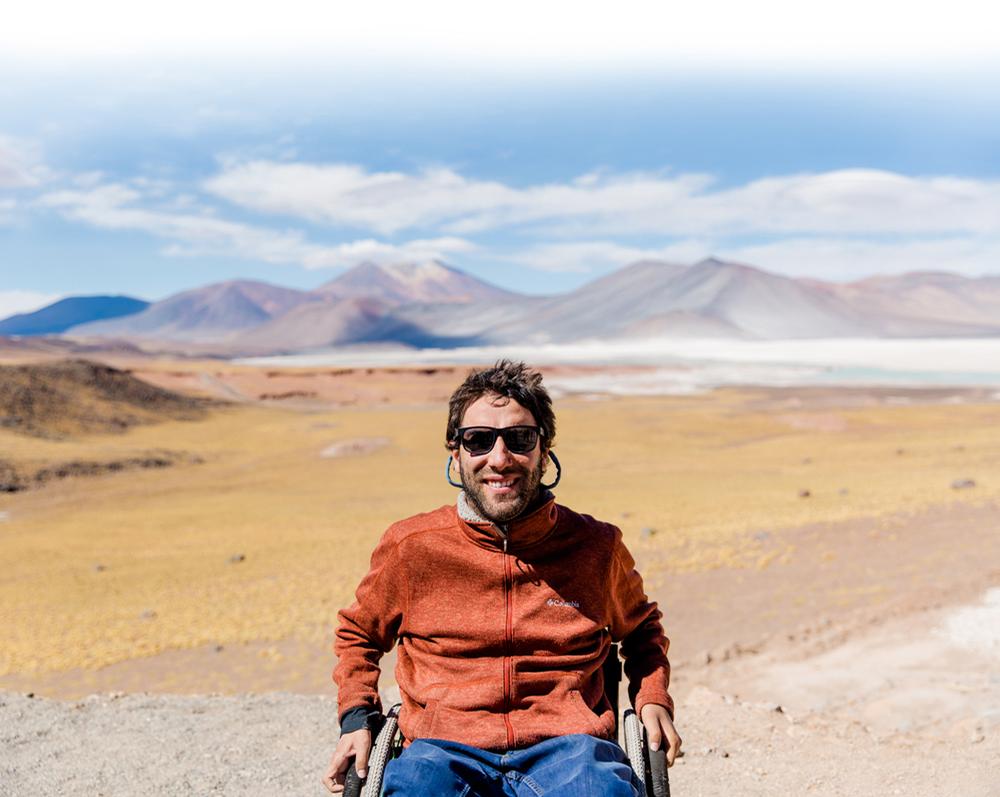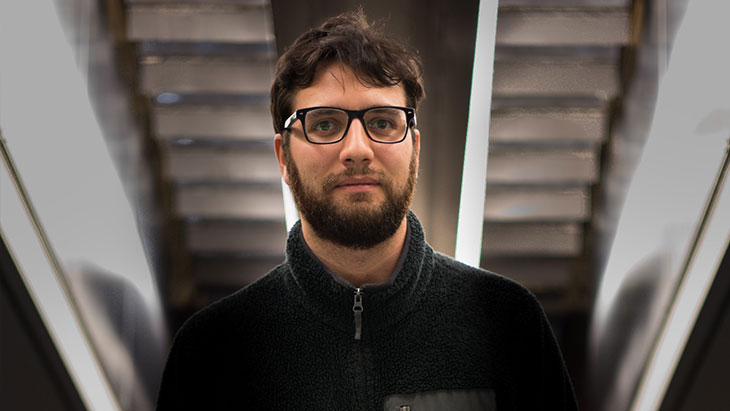“I wanted to go hiking in Patagonia with my best friend. The problem: He’s in a wheelchair. But I knew we had to make it happen.”
Camilo Navarro
Für die deutsche Version bitte nach unten scrollen.
Thirty years ago, I was a community service worker at an inclusive daycare center. We played and lived there with children who had physical and mental disabilities. Maybe that’s why, more than a year ago, the idea of this start-up immediately won me over: Camilo Navarro of Wheel the World told me about his idea at Plug and Play’s Selection Day in San Francisco. His three-minute pitch was so clear and passionate. I went to see him, got his business card, talked to him two more times, and invested in this start-up.
Wheel the World: the start-up
The idea of the two founders is phenomenal. 15% of the world’s population have “disabilities.” Many of us have friends or acquaintances who would love to travel to certain places, but they are out of reach for those friends. Often enough, the reason is that there is no information about whether the place can be reached with a wheelchair. Why not provide that information and help people make that trip? Camilo tells you more about this idea in the podcast.
Here are some of the key points:
Making the world accessible
Wheel the World not only makes the world accessible, but really opens it up to people who are constantly excluded by barriers. Wheel the World is an online booking platform for accessible travel with destinations in 15 countries on almost every continent (only Australia and New Zealand are currently excluded).
A potential of 15 percent of the world’s population is neglected in the travel market
All right, this point is striking. Of course, there is more to differentiate. For example, not all people who would depend on accessibility for travel can afford it. But even if Wheel the World’s actual target audience is only a fraction of that, the demand is clearly there: The 13 destinations the startup initially offered were booked by about 1,000 people with impairments in the first 18 months. Revenue generated exceeded $1 million.

The founders of Wheel the World did what successful startups have always done: They saw a problem, one that was relevant to many people. Moreover, Camilo and his business partner had a strong intrinsic drive to solve this problem. They didn’t need innovation labs or design thinking. After all, the solutions to the problem they tried to solve already existed – namely, booking and organizing specialized trips online – but these solutions were ignored or not considered profitable by the major booking platforms. It took a motivated start-up team – both of them were still students – to focus all their energy on this neglected target group.
Passion bordering on obsession
This can be hard to digest for some. But let me put it in Camilo’s words, “Building a start-up is like raising a kid.” You don’t just put it out into the world and wait for it to develop on its own. Depending on what stage of growth it is in, it needs different level of attention and undeniably the most in the beginning. These are Camilo’s tips for launching a startup:
1. Do lots and lots of research. That means reading very, very much to get to the bottom of the problem and develop the business plan.
2. Research a lot again, this time to find investors, because there are a large number of awards and formats available to utilize.
3. Learn how to write. If you can’t express and present yourself well enough in writing to sell your plan, you won’t be able to do so in a conversation. Writing is something you have to learn and practice.
What became even clearer to me as I listened is that the trend towards more sustainable business and business models with social impact is here to stay. I am very happy that I can support this idea with a little bit of money.
You can find more podcast episodes (in German) about founding companies and start-ups here and podcast episodes about sustainability here.
Reisen ohne Barrieren – mit Start-up-Gründer Camilo Navarro, Wheel the World
Vor 30 Jahren war ich Zivildienstleistender in einer integrativen Kindertagesstätte. Wir spielten und lebten dort mit Kindern, die körperliche und geistige Beeinträchtigungen hatten. Vielleicht hat mich deshalb vor über einem Jahr die Idee dieses Start-ups sofort überzeugt: Camilo Navarro von Wheel the World erzählte auf dem Selection Day von Plug and Play in San Francisco von seiner Idee. Sein Pitch von drei Minuten war so klar und leidenschaftlich. Ich ging zu ihm, holte mir seine Visitenkarte, sprach noch zwei Mal mit ihm und investierte in dieses Start-up.
Wheel the World: das Start-up
Die Idee der beiden Gründer ist einfach phänomenal. 15 Prozent der Weltbevölkerung hat “disabilities”. Viele von uns haben Freunde oder Bekannten, die gerne einmal an einen Ort reisen würden, der aber unerreichbar für diese Freunde ist. Der Grund ist oft genug, dass es keinerlei Informationen darüber gibt, ob man den Ort zum Beispiel mit einem Rollstuhl erreichen kann. Warum nicht diese Information bereitstellen und Menschen dabei helfen, diesen Tripp zu machen? Mehr zu dieser Idee erzählt euch Camilo im Podcast selbst.
Das sind die drei Hauptpunkte
Die Welt zugänglich machen
Wie das mit Übersetzungen so ist, hinkt auch diese dem Original hinterher: „Making the world accessable“, sagte Camilo wörtlich. Wheel the World macht die Welt nicht nur zugänglich, sondern erschließt sie richtiggehend für Menschen, die ständig durch Barrieren ausgeschlossen werden. Wheel the World ist eine Online-Buchungsplattform für barrierefreie Reisen mit Zielen in 15 Ländern auf fast allen Kontinenten (nur Australien und Neuseeland sind aktuell noch ausgenommen).
Ein Potenzial von 15 Prozent der Weltbevölkerung wird auf dem Reisemarkt vernachlässigt
Gut, dieser Punkt ist plakativ. Natürlich gibt es da mehr zu differenzieren. Beispielsweise können sich nicht alle Menschen, die auf Barrierefreiheit beim Reisen angewiesen wären, das auch leisten. Aber selbst, wenn die tatsächliche Zielgruppe von Wheel the World nur einen Bruchteil davon ausmacht, die Nachfrage ist ganz deutlich vorhanden: Die 13 Destinationen, die das Start-up anfänglich anbot, wurden in den ersten 18 Monaten von rund 1.000 Menschen mit Beeinträchtigungen gebucht. Die generierten Umsätze überstiegen eine Million Dollar.
Die Gründer von Wheel the World haben das gemacht, was erfolgreiche Unternehmensgründerinnen und Unternehmensgründer seit jeher tun: Sie sahen ein Problem, und zwar sogar ein solches, das für sehr viele Menschen relevant ist. Außerdem hatten Camilo und sein Geschäftspartner einen starken intrinsischen Antrieb, dieses Problem zu lösen. Sie brauchten keine Innovationlabs oder Design Thinking. Die Lösungen für das zu lösende Problem gab es ja schon – nämlich das Online-Buchen und Organisieren von spezialisierten Reisen – aber sie wurden von den großen Buchungsplattformen ignoriert oder nicht als profitabel angesehen. Erst ein motiviertes Start-up-Team – beide waren gleichzeitig auch noch Studenten – konnte es sich leisten, seine ganze Energie auf diese vernachlässigte Zielgruppe zu konzentrieren. (Lest hierzu auch meinen Blogbeitrag: „Gründen: harte Arbeit und ein Problem“.)
Leidenschaft an der Grenze zur Besessenheit
Das kann für die ein oder anderen schwer zu verdauen sein. Aber lasst es mich mit Camilos Worten sagen: „Building a startup is like raising a kid.” Man setzt es nicht einfach in die Welt und wartet, dass es sich von alleine entwickelt. Je nachdem, in welcher Phase seines Wachstums es sich befindet, braucht es unterschiedlich viel Aufmerksamkeit und zu Beginn unbestritten am meisten. Das sind die Tipps von Camilo für den Start eines Start-ups:
1. Viel, sehr viel recherchieren. Das heißt sehr, sehr viel lesen, um dem Problem auf den Grund zu gehen und den Businessplan zu erarbeiten.
2. Wieder sehr viel recherchieren, diesmal, um Investoren zu finden, weil es dafür unglaublich viele Awards und Formate gibt.
3. Schreiben lernen. Wer sich schriftlich nicht so gut ausdrückt und präsentiert, dass er oder sie den eigenen Plan verkaufen kann, wird das auch im Gespräch nicht können. Schreiben muss man lernen und üben.
Zu diesen Tipps empfehle ich euch aus meinem Blog: „Über das Schreiben & Gedankenfreilegen“ und „Lernen und noch mehr lernen, oder: vom Lesen ins Tun kommen“.
Was mir beim Zuhören noch klarer geworden ist: Der Trend zu nachhaltigerem Wirtschaften und zu Businessmodellen mit sozialem Impact ist nicht mehr aufzuhalten. Ich bin sehr froh, dass ich mit ein wenig Geld diese Idee unterstützen kann.
Mehr Podcast-Folgen zum Thema Unternehmensgründung und Start-ups findet ihr hier und Podcast-Folgen zum Thema Nachhaltigkeit hier.




